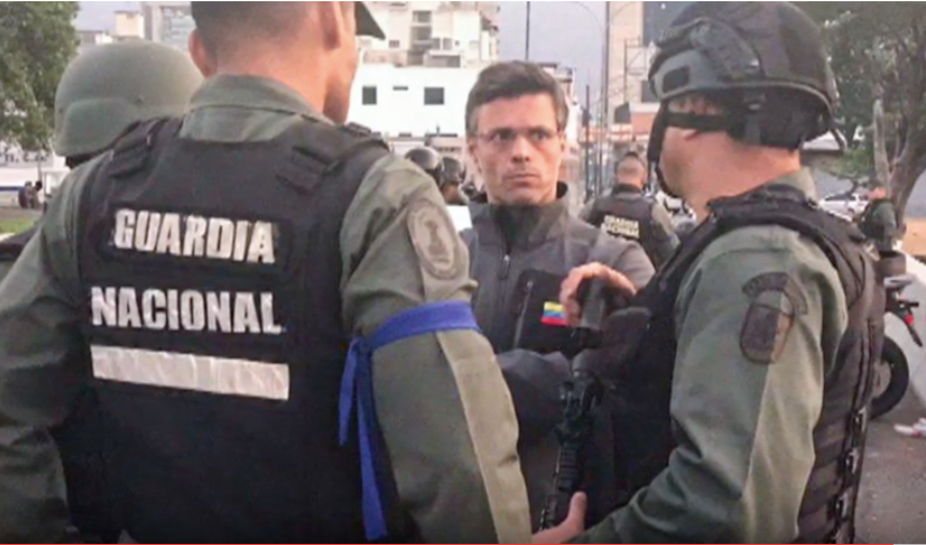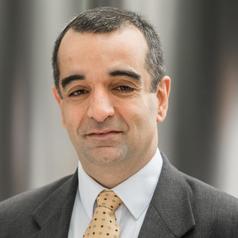Venezuela’s crisis has escalated to new levels.
In the early morning hours of April 30, Juan Guaidó – the leader of the Venezuelan National Assembly, who swore himself in as interim president in January – called for an uprising against President Nicolás Maduro’s authoritarian government.
In a video posted on social media, Guaidó, flanked by soldiers, asked Venezuelans to join him in the streets on May 1 for the final stage of “Operation Freedom.” This mass protest and military uprising would be “the beginning of the end” of a regime Guaidó and over 50 countries including the United States consider illegitimate.
In the background of the video, standing resolutely alongside Guaidó and rebel soldiers, was a figure stunning to see: Leopoldo López, Venezuela’s most famous political prisoner.
Uprising in Caracas
Under President Maduro, who took office in 2013, Venezuela’s economy has faltered, then collapsed. Food, medicine and electricity are scarce. Maduro has refused to budge, claiming the country’s economic troubles and popular unrest are a U.S. plot against him.
López, a former mayor and presidential candidate, was a leading figure in the powerful protest movement against Maduro that began in 2014.
After one major anti-Maduro march in Caracas grew violent, the popular politician was charged with “arson and criminal incitement.” The moment López waded through crying supporters to turn himself into police on May 18, 2014, he became the face of Venezuela’s fight for freedom and democracy.
Supporters saw him as a martyr who confronted the dictatorship rather than going into exile, as so many Venezuelan dissidents have. He was sentenced to 14 years in prison.
López’s face was printed on T-shirts, posters and flags that flew across the country. A website, FreeLeopoldo.com, called for “the immediate release of Venezuelan opposition leader Leopoldo López, who was illegally imprisoned in an attempt to silence dissent and free speech.” #FreeLeopoldo spread his cause across worldwide.
After three years, the Maduro government in 2017 conceded to intense political pressure and released López to house arrest in the swanky Los Palos Grandes neighborhood. López, caged, was the embodiment of Venezuela’s vanquished opposition.
Then, three months ago, Juan Guaidó reinvigorated the resistance movement by waging a full frontal assault on Maduro. And López, who was freed from house arrest by the soldiers guarding his home, who were acting on Guaidó’s orders, has rejoined the resistance.
Seeing Leopoldo López standing with Guaidó on that video, as a free man, openly calling for an uprising, was a potent signal for Venezuelans after years of bloody protest and multiple thwarted coup attempts.
Leopoldo López’s political pedigree
López is the great-great grandson of former Venezuelan president Cristóbal Mendoza and is said to be related to Simón Bolívar, the Venezuela-born general who liberated five South American countries from Spanish rule in the early 19th century.
López studied economics and sociology at Kenyon College in the United States on a swimming scholarship. In 1996, he got a Master’s in public policy at Harvard.
He began his political career in 2000, with two four-year terms as the handsome, dynamic and popular mayor of Chacao, an upper middle-class municipality of Caracas. By 2008, the end of his second term, he had a 92% approval rating.
That’s when President Hugo Chávez, Venezuela’s late Socialist leader and Maduro’s mentor, accused López of corruption and banned him from running for office. López was one of many popular Venezuelan politicians to face trumped up charges that served to stop them from electorally challenging Chávez.
In 2011 the Inter-American Court of Human Rights ruled that López’s must be allowed to run for office – an order the Venezuelan Supreme Court rejected.
López, who planned to run for president against Chávez representing the Voluntad Popular – a political party he, Guaidó and other opposition figures founded in 2009 – withdrew his candidacy. Instead, he backed opposition candidate Henrique Capriles Radonski.
Chávez won the 2012 presidential election, then died a few months into his term. Maduro, his vice president, took power in 2013.
López was sentenced to prison a year later. While he was jailed, López’s wife, Lilian Tintori, became a thorn in Maduro’s side. She traveled around the world meeting heads of state and denouncing human rights violations in Venezuela. She met with Latin American presidents, Pope Francis and, in February 2015, Joe Biden.
In February of 2017 Tintori traveled to Washington to see U.S. President Donald Trump and Vice President Mike Pence, who have both condemned Maduro and expressed public support for her husband.
The Chilean Embassy in Caracas has now announced that Tintori, Leopoldo López and their children were received as “guests” of the Chilean government.
The outcome of Guaidó’s effort to oust Maduro is uncertain. But whenever democracy is restored in Venezuela, López will surely be the presidential candidate to watch.



 BTC Flat at $89,300 Despite $1.02B ETF Exodus — Buy the Dip Toward $107K?
BTC Flat at $89,300 Despite $1.02B ETF Exodus — Buy the Dip Toward $107K?  Israel Approves West Bank Measures Expanding Settler Land Access
Israel Approves West Bank Measures Expanding Settler Land Access  Federal Judge Restores Funding for Gateway Rail Tunnel Project
Federal Judge Restores Funding for Gateway Rail Tunnel Project  Trump Lifts 25% Tariff on Indian Goods in Strategic U.S.–India Trade and Energy Deal
Trump Lifts 25% Tariff on Indian Goods in Strategic U.S.–India Trade and Energy Deal  Trump Administration Appeals Court Order to Release Hudson Tunnel Project Funding
Trump Administration Appeals Court Order to Release Hudson Tunnel Project Funding  Sydney Braces for Pro-Palestine Protests During Israeli President Isaac Herzog’s Visit
Sydney Braces for Pro-Palestine Protests During Israeli President Isaac Herzog’s Visit  Ghislaine Maxwell to Invoke Fifth Amendment at House Oversight Committee Deposition
Ghislaine Maxwell to Invoke Fifth Amendment at House Oversight Committee Deposition  Trump’s Inflation Claims Clash With Voters’ Cost-of-Living Reality
Trump’s Inflation Claims Clash With Voters’ Cost-of-Living Reality  China Overturns Death Sentence of Canadian Robert Schellenberg, Signaling Thaw in Canada-China Relations
China Overturns Death Sentence of Canadian Robert Schellenberg, Signaling Thaw in Canada-China Relations  Bosnian Serb Presidential Rerun Confirms Victory for Dodik Ally Amid Allegations of Irregularities
Bosnian Serb Presidential Rerun Confirms Victory for Dodik Ally Amid Allegations of Irregularities  Taiwan Says Moving 40% of Semiconductor Production to the U.S. Is Impossible
Taiwan Says Moving 40% of Semiconductor Production to the U.S. Is Impossible 
































